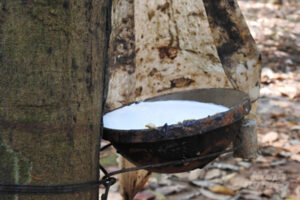Thailand sees highest export rate in thirty years
Bangkok, Thailand – Thailand’s commerce minister Jurin Laksanawisit was upbeat about Thailand’s export growth, saying the 19.5 per cent year-on-year surge in March was the highest in 30 years.
Jurin, who also doubles as a deputy prime minister, told the press on April 26 that exports last month alone were worth $28.86 million, or about 922.313 million baht. This marked a 19.5 per cent growth compared to March last year and was the biggest expansion since 1991.
At the end of the first quarter, Thailand’s export value stood at $73.6 million, or 2.4 billion baht, which was 14.9 per cent higher compared to the same period last year.
The minister credited the growth to cooperation between the commerce ministry and the private sector as well as the normalisation of Thailand’s ties with Saudi Arabia.
The top 10 markets with the highest export growth in March were Switzerland (2,864.7 per cent), South Asia (36.4 per cent), ASEAN (34.8 per cent), the Middle East (29.5 per cent), the US (21.5 per cent), the UK (14.5 per cent), South Korea (14.5 per cent), Taiwan (9.4 per cent), Canada (9.2 per cent) and the EU (6.9 per cent)
Earlier this month, however, the Thai National Shippers’ Council (TNSC) reported that the Russia-Ukraine conflict and rising production costs were pressuring Thailand’s export sector.
The TNSC said Thailand’s export value in the first two months this year was $44.74 billion, up 12.2 per cent year-on-year. Exports were worth $21.25 billion in January and $23.48 billion in February, up eight per cent and 16.2 per cent, respectively.
TNSC chairman Chaichan Charoensuk said January-February exports expanded strongly on orders made before Russia began its military offensive against Ukraine on February 24.
He expects Thai exports to fall below five per cent in the second quarter under pressure from the Russia-Ukraine conflict and the resulting rise in production costs.
“The price of Thai export goods has increased by five-to-10 per cent,” he added.
The TNSC, trade associations and industries concluded late last month that the conflict in Ukraine would drag on and continue to drive up prices of raw materials, Chaichan said.
Russia’s ban on exports of crude oil, natural gas and rare minerals, as well as economic sanctions on Moscow, were affecting many industries, he added.
However, five major Thai exports – rubber and rubber products, foods, cassava products, sugar and rice – would help lift revenue amid the Russia-Ukraine crisis.
“Meanwhile, tyres, textiles, auto parts, plastic beads and electrical appliances will also boost Thai exports,” he added.
Chaichan warned, however, that the microchip shortage in the automobile industry should be tackled urgently as Russia’s ban on exports of chip materials would exacerbate the issue.
TNSC cut its forecast for Thailand’s export growth this year from five-to-eight per cent to no more than five per cent. Thai exports would drop further if the Russia-Ukraine conflict drags on and sparks further inflation and contraction of the global economy, Chaichan added.

